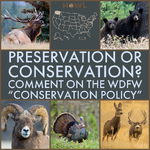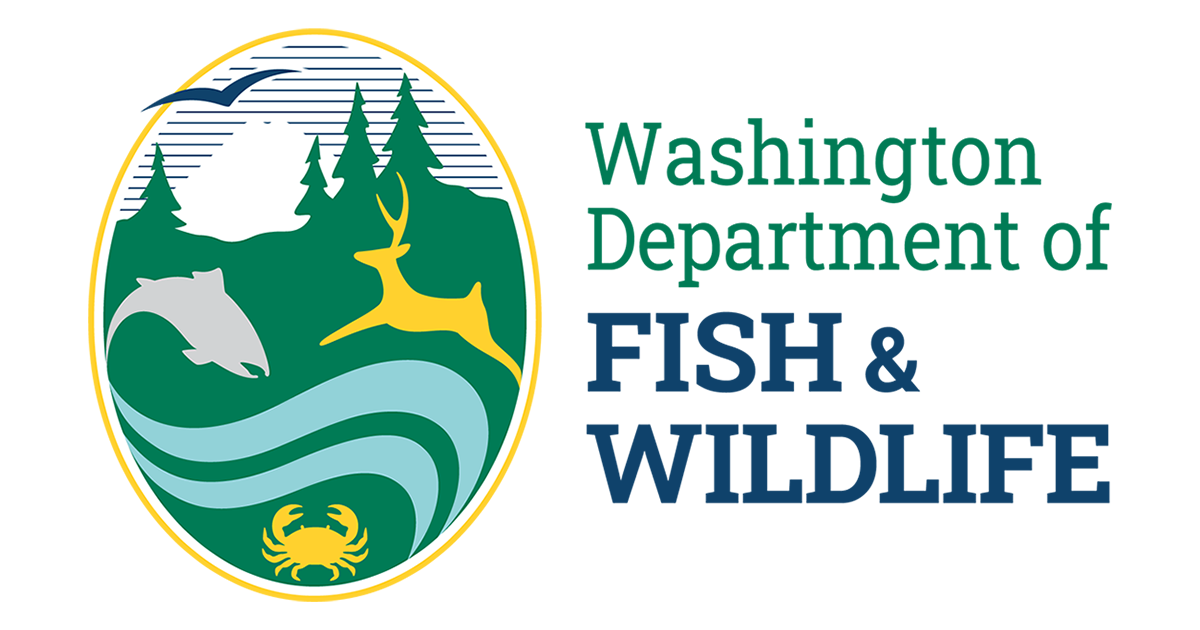- Joined
- Mar 17, 2022
- Messages
- 47

Without the recent decisions, actions, statements, & mishandlings of issues like the cancellation of spring bear hunting, rule breaking private communications during commission meetings that affected votes, and recent commissioners presently being on the advisory boards of anti-hunting organizations, maybe we wouldn't be suspicious of this new "conservation draft policy" presented by the WDFW Commission. But in the spirit of protecting wildlife, the North American Model of Wildlife Conservation, a century's worth of true conservation success stories through Pittman Roberson, Dingell-Johnson, and the numerous ways that sportsmen contribute to the health, prosperity, and progress of North America's wildlife, one should be concerned.
- Role of Hunting in Conservation: Historically, hunting has played a significant role in conservation efforts in the United States. Unregulated killing and habitat destruction in the late 19th century pushed many species to the brink of extinction. In response, sportsmen organized conservation groups and advocated for hunting regulations. This marked a turning point in conservation and is a reason why many species that are hunted today still persist1.
- Funding Conservation: Hunting-related activities provide a substantial amount of funding for conservation. For example, in 2017, more than 15 million Americans purchased a hunting license, generating over $500 million in revenue for conservation. Also, most states use the revenue from license sales as matching funds they must have to gain access to funding from acts like the Pittman-Robertson Act and the Dingell-Johnson Act, which generate revenue through excise taxes on firearms, ammunition, and fishing equipment, respectively1. Hunters also raise millions of dollars and contribute thousands of volunteer hours to conservation through their memberships in organizations such as the National Wild Turkey Federation and Ducks Unlimited1.
- Wildlife Management: Hunters play a crucial role in managing the size of certain animal populations. Some prey animals, such as elk or deer, can become overabundant in their habitat due to a lack of predators or landscape changes. This overabundance can threaten the well-being of other species and in some instances, impact human health and safety. Regulated hunting is an effective tool that state wildlife agencies use to manage the overpopulation of a species. Wildlife managers model population growth and set management regulations based on field research and harvest data, which can be informed by hunter reports1.
The draft, in development by a few members of the Fish and Wildlife Commission and WDFW staff for about two years, would direct the agency “to preserve and protect Washington’s fish and wildlife and their habitats by proactively addressing current and emerging conservation challenges,” Read more here.
Recent Commissioner Thorburn has this to say about the draft:
“not good governance,” as well as an “advancement of an animal rights preservationist ideological agenda, not conservation.”
Those are the words of Kim Thorburn of Spokane in a May 20 letter to her old colleagues in fish and wildlife policy and management oversight. Thornburn was not surprising re-appointed to the commission by Washington Gov. Inslee. Read more on this here.
RMEF has this to say about the draft:
The draft commission Conservation Policy has apparently been under development for two years, but the public and sportsmen and women have only been given access to it since April. This is troubling for several reasons. First, the policy creates an entirely new definition of “conservation” that uses several political buzz-words common in the anti-hunting movement. Second, the policy cherry-picks portions of the statutory mandate of the commission, specifically the “preserving and protecting” of wildlife while it is silent to the rest of RCW 77.04.012 that requires the commission to “perpetuate and manage the wildlife and food fish, game fish, and shellfish” of the state. Finally, a major concern is the policy introduces the “Precautionary Principle” as one of the guiding concepts, which is very controversial in wildlife management as it is used to overrule scientific-based management whenever uncertainty exists, and is used to restrict harvest or implement restrictive regulations even when population impacts cannot be measured.
How To Get Involved:
Register to speak at the June 22 commission meeting or attend:
Watch/Participate with Zoom
Agenda
Register Here To Speak Virtually: https://wdfw.wa.gov/about/commission/meetings/public-testimony - be sure to select June 22 & "5. Conservation Policy – Briefing, Public Comment" The comment period for the draft conservation policy is scheduled at 3:55p on Thursday June 22.
To Attend in Person:
Location: Residence Inn by Marriott Seattle Downtown/Lake Union
800 Fairview Ave N, Seattle, WA 98109
Port Townsend Meeting Room
In-Person Participation:
If you want to provide testimony in-person, please complete a "Public Testimony" form (available at the meeting registration table) before starting that agenda item. Submit your completed form to the Commission representative at the registration table before that agenda item. When registering to testify, please provide your first and last name, what topic you would like to speak about, a valid email address, and a phone number.
Below is your opportunity to comment directly to the WDFW's portal to comment on this draft. We've put together a log of numerous 1-2 paragraph success stories of the North American Model of Wildlife Conservation & success stories of wildlife and habitat being restored, recovered and abundant due to sportsment dollars. These are for you use to start your conversation. Each user will see different content below. Edit at will, please be polite. You can additional submit comments here.


